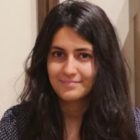Sofia Arevalo is a School of Engineering Distinguished Postdoctoral Fellow whose research uses experimental and computational methods to assess and develop novel biomaterials for use in tissue engineering. Her doctoral research explored a family of polymers with useful attributes that could enhance function and longevity in the body. Sofia’s work demonstrated the validity of using nano-indentation for characterizing medical-grade polymers, and her insights into the nano-mechanical properties of these materials could improve the design and function of long-term structural applications and broaden our understanding of the mechanics of other bio-inspired systems. As a postdoctoral fellow, she is utilizing molecular dynamics and machine learning to gain insights into the binding affinity of metal-protein complexes for the development of novel self-healing materials for tissue engineering. Sofia’s goal is to develop nano-mechanical techniques to investigate the degeneration and progression of diseases, such as osteoarthritis and cancer, and to develop a technique to measure and model the interfacial bond strength of composites. Sofia’s innovative work has important implications in several fields, including engineering materials, polymer mechanics, materials characterization, and implant design. Her future work holds the potential to support exciting advances in materials science, biomechanical engineering, and clinical medicine.
https://engineering.mit.edu/wp-content/uploads/2023/02/Arevalo.jpg
Website
Sofia Arevalo
Civil and Environmental Engineering https://engineering.mit.edu/fellows/sofia-arevalo/Molly Carton is a School of Engineering Distinguished Postdoctoral Fellow whose research interests lie at the interface of computational design of materials, fabrication, and robotics. She uses algorithmic design and computational fabrication to generate architected materials and mechanisms with new mechanical properties and to explore how those properties can be deployed to create sensors, actuators, and robotic and deployable systems. Her research includes designing scalable simulation techniques to understand the properties of these materials and structures within tractable limits of time and computation resources. Her work on computational geometry and the development of machine-controlled fabrication processes have led her to explore the larger challenge of creating frameworks for next-generation fabrication tools. Molly’s work has the potential for a major impact on materials design and fabrication and could advance the use of architected materials with valuable properties, from soft robots and shape-morphing 4D printed structures that can be manufactured on demand and deployed at record speed to medical devices that are tailored to the individual patient.
https://engineering.mit.edu/wp-content/uploads/2023/02/Carton.jpg
Website
Molly Carton
Mechanical Engineering https://engineering.mit.edu/fellows/molly-carton/Steven Ceron is a School of Engineering Distinguished Postdoctoral Fellow whose research interests encompass the design, fabrication, and control of robot swarms at the macro- and micro-length scales. His doctoral research focused on simulation and physical implementations of macro-scale and micro-scale robot swarms and explored how interactions between agents’ physical features and their surrounding environment could be exploited to enable navigation, object manipulation, and dispersion. His postdoctoral research concentrates on developing a self-reconfigurable, modular robot swarm that enables reconfiguration, manipulation, and distributed sensing. Steven’s objectives include exploring how a structure could form itself from robotic building blocks, with the capacity to adjust and repair itself in response to changes in the surrounding environment. This work is a crucial step in the long-term vision of swarm robotics and modular self-reconfigurable robots. Steven’s self-reconfigurable robot swarm and its distributed coordination schemes offer valuable insights for the general robotics community and hold great potential for diverse applications, including biomedicine, exploration of hard-to-reach environments, and autonomous robot collective construction.
https://engineering.mit.edu/wp-content/uploads/2023/02/Ceron-1.jpg
Website
Steven Ceron
Electrical Engineering and Computer Science https://engineering.mit.edu/fellows/steven-ceron/Matthew Clarke is an MIT-Boeing Distinguished Postdoctoral Fellow whose research focuses on aircraft design, aerodynamics and aeroacoustics, and the optimization of electric vehicles for regional and urban air mobility (UAM). As a doctoral candidate, Mathew worked on synthesizing a multi-fidelity approach for predicting the performance and acoustic footprint of electric short/vertical takeoff and landing aircraft (eS/VTOLs), balancing fast, iterative design with high-resolution analyses within the flight profile. As a postdoctoral fellow, he will build upon this work in three areas: aerodynamic and aeroacoustic optimization of UAM Vehicles; lithium-ion battery modeling for aerospace applications; and addressing the challenges of future aviation policy and air traffic control. Through his research, Matthew is bridging the gap between aircraft conceptual design and electrochemical cell (power sources) modeling and tackling systems-level challenges such as the integration of eS/VTOLs and UAM vehicles into existing transportation infrastructure. His work holds tremendous promise to advance UAM technology and aerospace engineering. In addition, he is developing innovative techniques, including multi-fidelity techniques, high-fidelity numerical simulations, quantification of uncertainties in the design, and high-dimensional mathematical optimization, that will support cutting-edge research in many domains.
https://engineering.mit.edu/wp-content/uploads/2023/02/Clarke.jpg
Website
Matthew Clarke
Aeronautics and Astronautics https://engineering.mit.edu/fellows/matthew-clarke/Suhas Eswarappa Prameela is a Department of Aeronautics and Astronautics Distinguished Postdoctoral Fellow specializing in the advancement of metallic and ceramic materials for extreme dynamic environments. Their research combines high-throughput experiments, advanced manufacturing techniques, and innovative alloy design methods to engineer resilient materials tailored for applications such as space structures and reusable rocket engines, ensuring their durability in high-temperature, shock-prone, and diverse extreme conditions. Suhas’s work holds the promise to revolutionize space exploration, bolster defense capabilities, and transform transcontinental earth-to-earth travel. Utilizing cutting-edge thermo-mechanical processing and additive manufacturing, Suhas’s research goal is to design materials crucial for a safer and more sustainable future, pushing the boundaries of materials science to enable humanity’s progress on the challenging frontiers of space and beyond.
https://engineering.mit.edu/wp-content/uploads/2023/02/Prameela.jpg
Website
Suhas Eswarappa Prameela
Aeronautics and Astronautics https://engineering.mit.edu/fellows/suhas-eswarappa-prameela/Amy Rae Fox is a METEOR and School of Engineering Distinguished Postdoctoral Fellow whose research centers on the role of cognition in information visualization and diagrammatic reasoning. At MIT, Amy is investigating interactive visualization to address a central challenge in visualization research and design: the common belief that extracting insights from visual data is easy when, in fact, we rely on years of explicit training and implicit exposure. Amy’s doctoral research examined the integration of perceptual and knowledge-driven processing in graphical discovery—an often-neglected stage of graph comprehension that characterizes how humans construct meaning for unfamiliar graphs. The goal of her postdoctoral work is to lay the groundwork for a generalized theory of interaction through mixed-method research. This theory will support her future efforts to leverage what we know about human cognition when building information systems and artifacts and, conversely, to study their everyday use to advance theories of human cognition. As visualization becomes a central medium for communication and decision-making, Amy’s work has the potential for significant social impact, from scientific research and data analysis to personal decisions about our health and well-being.
https://engineering.mit.edu/wp-content/uploads/2023/02/Fox.jpg
Website
Amy Rae Fox
Electrical Engineering and Computer Science https://engineering.mit.edu/fellows/amy-rae-fox/Timothy Holder is an MIT-IBM Distinguished Postdoctoral Fellow whose research lies at the intersection of psychophysiological engineering and affective computing. Specifically, Timothy is working to develop wearable, noncontact, and remote psychophysiological sensor systems for use in a wide range of dyadic, affective, and citizen science contexts. The aim of these systems is to quantitatively detect the psychophysiological states of humans and animals as they interact to form relationships and mutually beneficial bonds. Potential applications include canine-assisted therapies, human-robot interactions, telehealth, and monitoring/assessment of cancer fatigue, PTSD-related events, and autism-related issues. His postdoctoral research explores several new avenues, including achieving higher resolution in psychophysiological indicators of specific dyadic interactions such as student-teacher and employer-employee; adapting multimodal systems to various animals (dogs, horses, etc.); and actualizing telemedicine interventions. Timothy’s work has exciting potential to advance our understanding of causal attribution (connecting environmental and interaction inputs directly to mental, emotional, or physical outputs) and could be applied to support improved health and relationships in a wide variety of human-other contexts.
https://engineering.mit.edu/wp-content/uploads/2023/02/Holder-1.jpg
Website
Timothy Holder
Aeronautics and Astronautics https://engineering.mit.edu/fellows/timothy-holder/Michael D. Kitcher is a School of Engineering Distinguished Postdoctoral Fellow whose research examines spin transport and chiral interactions in magnetic materials with the goal of developing next-generation spintronic devices. Specifically, Michael’s work is centered on understanding and manipulating noncollinear spin textures—such as domain walls, spin waves, and skyrmions—which hold great promise as building blocks for energy-efficient spintronics. For his doctoral research, he studied the interplay between the Dzyaloshinskii–Moriya Interaction (DMI)—a critical property for various proposed magnetic memory systems—and different forms of reduced symmetry in ferromagnetic multilayer thin films. As a postdoctoral fellow, Michael is investigating superfluid spin transport in magnetic insulators and characterizing the behavior of the spin spirals that mediate this process. Beyond developing new approaches to maximize the efficiency of spin superfluidity in nonlocal devices, he continues to pursue his interests in observing and harnessing chiral phenomena that emerge at the intersection of structural and dynamic symmetry breaking in magnetic thin films. Michael’s research has the potential to deliver important advances in our understanding of magnetic materials and birth impactful technologies that address far-reaching societal issues, such as the surging energy demands of computing.
https://engineering.mit.edu/wp-content/uploads/2023/02/Kitcher.jpg
Website
Michael Kitcher
Materials Science and Engineering https://engineering.mit.edu/fellows/michael-kitcher/Ulri Lee is a Department of Electrical Engineering and Computer Science Distinguished Postdoctoral Fellow whose research integrates microfluidics and analytical chemistry to build new bioanalytical microfluidic tools to understand the environment and human health. As a doctoral candidate, Ulri developed a novel open-microfluidic patterning method that utilizes surface tension forces to form biological cell-laden hydrogel layers; the resulting multi-gel and multi-cell 3D structures have a wide range of potential applications in tissue engineering and organ-on-chips technologies and could be beneficial to researchers in biology, fluidics, and engineering labs that seek prototyping solutions. As a postdoctoral fellow, Ulri is pursuing new innovations in open microfluidics, focusing on a blood-brain barrier (BBB) to study neuropsychiatric diseases. Her goal is to engineer a novel platform that is streamlined and user-friendly and will enable researchers to perform many organs-on-chip in parallel. This technology could enable researchers to study the BBB with no need for engineering experience, leading to wider dissemination of this technology. Ulri’s path-breaking work is expanding fundamental knowledge in open-droplet microfluidics and has the potential to support innovations in many domains, including environmental science and medicine.
https://engineering.mit.edu/wp-content/uploads/2023/02/Lee.jpg
Website
Ulri Lee
Electrical Engineering and Computer Science https://engineering.mit.edu/fellows/ulri-lee/Jorge A. Méndez is an MIT-IBM Distinguished Postdoctoral Fellow whose research interests are in the field of lifelong reinforcement learning, a crucial domain of machine learning that seeks to develop agents with the capacity to accumulate knowledge as they experience their environment and reuse this knowledge to adjust rapidly to change. This ability could dramatically improve the performance of ML systems in dynamic environments, from hate-speech detection models to search-and-rescue robots working in fast-changing contexts. For his doctoral research, Jorge developed one of the first general-purpose frameworks for lifelong discovery of compositional representations, which endows agents with the ability to acquire and reuse composable knowledge and combine and adapt that knowledge at scale to solve increasingly complex tasks. As a postdoctoral fellow, he continues to explore the principles of compositionality and develop strategies that enable robots to decompose complex behaviors into reusable skills, continually adapting and improving their own performance during long-term deployment. His plans involve applying the techniques of lifelong compositional learning to large-scale and long-term robot deployments, including across multiple homes, while preserving user privacy.
https://engineering.mit.edu/wp-content/uploads/2023/02/Méndez.jpg
Website
Jorge Méndez
Electrical Engineering and Computer Science https://engineering.mit.edu/fellows/jorge-mendez/Kristina Monakhova is an MIT-Boeing Distinguished Postdoctoral Fellow whose research bridges computational imaging and artificial intelligence to create more capable cameras, microscopes, and telescopes. In her doctoral work, Kristina developed cheap, miniature compressive cameras and microscopes as well as physics-informed machine learning techniques for single‐shot 3D fluorescence microscopy, compressive hyperspectral imaging, and low light photography. As a postdoctoral fellow, Kristina is focused on designing new algorithms and uncertainty quantification techniques for multiphoton microscopy, with applications in label-free imaging and seeing through scattering media. Kristina will start as an assistant professor in Cornell University’s Department of Computer Science after the completion of her fellowship, where she will start a new computational imaging lab that will focus on co‐designing camera hardware and algorithms specifically for higher‐level tasks to create better-informed autonomous systems and enable more robust decision-making. Kristina’s work serves the specialized sensing needs of myriad data science and artificial intelligence pipelines. By developing new methods to capture informative measurements, her research has the potential to advance a broad range of intelligent systems, from miniature robotics to biomedical imaging to precision agriculture.
https://engineering.mit.edu/wp-content/uploads/2023/02/Kristina.jpg
Website
Kristina Monakhova
Electrical Engineering and Computer Science https://engineering.mit.edu/fellows/kristina-monakhova/George Moore is a School of Engineering Distinguished Postdoctoral Fellow whose research interests lie at the intersection of design, manufacturing, and sustainability. Specifically, George is working to reduce environmental impacts and investigate factors of human well-being across the initial stages of the design process, such as problem framing and concept generation, to the final stages of digital fabrication and manufacturing. Some of his current postdoctoral work involves studying student engagement with digital fabrication tools in university makerspaces. George’s other projects involve studying (1) barriers to sustainable practices in spaces dedicated to digital fabrication and (2) the metrics used to determine manufacturability of design solutions. George’s long-term research mission is to help realize a digital fabrication and manufacturing ecosystem that prioritizes community well-being and environmental health.
https://engineering.mit.edu/wp-content/uploads/2023/02/Moore-1.jpg
Website
George Moore
Mechanical Engineering https://engineering.mit.edu/fellows/george-moore/Kimia Nadjahi is a School of Engineering Distinguished Postdoctoral Fellow whose research bridges the fields of machine learning (ML) and computational optimal transport. Her current work is focused on the sliced Wasserstein distance (SW), a relatively recent idea in the theory and practice of optimal transport. As a doctoral candidate, Kimia designed ML algorithms balancing practical advantages and theoretical justification, with the aims of enhancing their efficiency and scalability, expanding theoretical grounding, and improving robustness to missing data. In her postdoctoral research, Kimia plans to develop a theoretically grounded, scalable methodology to make predictions from high-dimensional, temporal data with missing entries, a crucial capability for applications in medicine and many other domains. She also hopes to pursue interdisciplinary collaborations to establish whether a connection can be established between SW for non-Euclidean data and generalized SW; establishing a metric for non-Euclidian data could have a powerful impact on numerous fields, including bioinformatics, neurology, life sciences and text mining.
https://engineering.mit.edu/wp-content/uploads/2023/02/Kimia-1.jpg
Website
Kimia Nadjahi
Electrical Engineering and Computer Science https://engineering.mit.edu/fellows/kimia-nadjahi/Maria Ramos Gonzalez is a School of Engineering Distinguished Postdoctoral Fellow whose multidisciplinary research covers human-in-the-loop for robotic manipulation tasks and neuroprosthetic feedback control paradigms for upper limb amputees. Maria’s doctoral research included the design and fabrication of a novel biocompatible polycarbonate urethane knee implant. She also designed and fabricated a multi-knee joint implant test apparatus for long-term wear testing and validation of the novel implant. As a postdoctoral fellow, Maria’s innovative work holds great promise for advancing our understanding of human sensation, improving prosthetic design and control, and delivering technologies that improve lives at all levels of integrated human robotics applications. In addition, she aims to make these kinds of life-enhancing engineering solutions accessible to underserved populations.
https://engineering.mit.edu/wp-content/uploads/2023/02/Gonzalez.jpg
Website
Maria Ramos Gonzalez
Mechanical Engineering https://engineering.mit.edu/fellows/maria-ramos-gonzalez/Matthew Rivera is a Department of Chemical Engineering Distinguished Postdoctoral Fellow whose research aims to decarbonize the chemical industry with advanced separation technologies by reducing the energy intensity of high-value chemical purification. His doctoral research investigated the solvent transport properties of molecularly mixed composite membranes (MMCMs), in which soluble additives are dispersed in polymeric membranes to make “one-phase composites.” The project represented a comprehensive molecular-to-modular design process exploring the potential impact of MMCMs on organic solvent separation processes. As a postdoctoral fellow, Matthew will leverage insights from data science and computational techniques to create designer materials for improving hydrocarbon separations. His goal is to develop machine learning architectures to understand the complex relationships between molecular structure and separation performance and identify ideal material properties for separation applications. By integrating materials informatics with separations research, Matthew’s research has the potential to advance both fields and address industrial challenges with greater speed and efficiency while dramatically reducing energy use.
https://engineering.mit.edu/wp-content/uploads/2023/02/Rivera.jpg
Website
Matthew Rivera
Chemical Engineering https://engineering.mit.edu/fellows/matthew-rivera/Joseph Wasswa is a School of Engineering Distinguished Postdoctoral Fellow whose research converges at the nexus of experimental and computational methodologies, where the overarching goal is to amalgamate analytical chemistry with computational tools, ultimately advancing our understanding of how contaminants undergo environmental fate and transformation. His doctoral research included studies of dissolved organic matter in lakes in New York’s Adirondacks Mountains, where increased “browning” has been observed due to climate change. Joseph also studied concentrations and patterns of synthetic trace organic contaminants, such as pesticides and personal care products, in surface and drinking water in Kampala, Uganda. As a postdoctoral fellow, Joseph is exploring data-driven predictive chemistry for informing the transformation, fate, and properties of environmental contaminants. Currently, he is carrying out two studies: 1) aims to provide insights into physicochemical properties and environmental fate of molecular compounds using graph neural networks and descriptor molecular representation-based machine learning models, and 2) combines high-resolution mass spectrometry and network analysis computational-based tools to elucidate reaction kinetics and mechanisms of environmental contaminants. His research could have profound societal ramifications because the data, tools, and knowledge he develops could lead to sustainable technologies, solutions, and strategies that can help in environmental protection.
https://engineering.mit.edu/wp-content/uploads/2023/02/Wasswa.jpg
Website